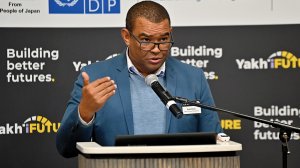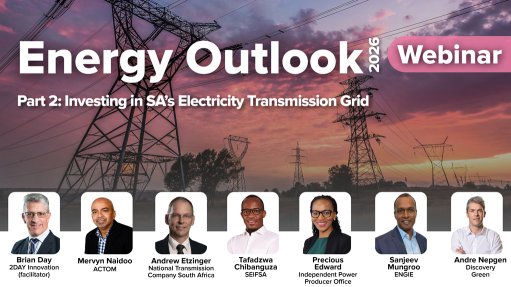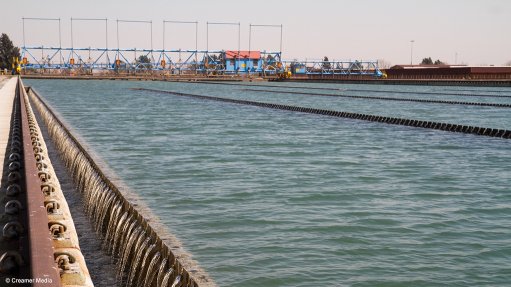Urgent skills development roadmap required for a just energy transition

South African Presidency project management office head Rudi Dicks talk about how skills development is needed to effect a Just Energy Transition in South Africa. Camerawork and Editing: Shadwyn Dickinson
To successfully effect a just energy transition (JET), South Africa needs to urgently identify the skills required and create a skills development roadmap, as it could take between five and ten years to ready the skills system for new value chains and competencies, South African Presidency project management office head Rudi Dicks has said.
He was speaking at a Skills for a Just Transition Conference hosted by the University of Witwatersrand Centre for Researching Education and Labour, the International Labour Organisation and the Zurich University of Teacher Education on May 11.
He added that the cross-cutting nature of skills interventions for the JET meant that South Africa needed to establish strong coordination and planning mechanisms.
Moreover, the country would need to unpack skills in extended and connected value chains, including the coal, renewable energy and green hydrogen value chains, as well the value chains associated with vehicles, and interlinked value chains such as platinum mining and manufacturing.
The skills identification, anticipation, planning and implementation for the JET would require both national level strategic support and local-level alignment.
“Complexity, extended value chains and the need to work across the education and training ecosystem require that many departments within government and many stakeholders in civil society, business and labour will need to work together to plan for and implement skills for a just transition,” Dicks said.
He noted that decarbonising South Africa’s economy to within the target range of 350-million to 420-million tonnes of carbon dioxide (CO2) equivalent by 2030 would require initial funding of about R1.5-trillion between 2023 and 2027.
This funding would need to be sourced from multiple sources, including developed countries, private sector investors, development finance institutions, government, philanthropies and multilateral development banks.
Dicks said the funding would need to be funnelled into three priority sectors – electricity, new energy vehicles and green hydrogen; and two cross-cutting areas – skills development and municipalities.
Without active intervention, coal-dependent and other regions would suffer significant socioeconomic impacts as South Africa responded to national and international shifts away from fossil fuels and carbon-intensive products, Dicks said.
He admitted that the JET would be particularly challenging for South Africa, given the country’s unique set of current circumstances. Principle among these was that South Africa was the most carbon-intensive major economy in the world, emitting 0.6 kg of CO2 per dollar of gross domestic product (GDP). It is also the largest carbon emitter in Africa, driving 40% of the continent’s total emissions.
Additionally, South Africa is the most economically unequal country in the world. Aside from having the highest Gini coefficient globally, the top 10% of the population owns 86% of the aggregate wealth.
The country also has untenable levels of unemployment, with 30% of the population unemployed, and youth unemployment in particular exceeding 65%. Moreover, about 55% of the country live in poverty.
The unemployment crisis is in part owed to an underperforming economy, where growth rates have declined over the last decade. The post-Covid-19 recovery has been constrained by insecure electricity supply, among other constraints, and the optimal debt-to-GDP is under strain.
Moreover, South Africa’s trade systems are vulnerable because of the degree of carbon embedded in its commodities and products. Where trading partners are accelerating efforts to decarbonise, this directly affects demand for South African commodities, impacting the balance of payments and competitiveness.
Dicks pointed out that research and emerging consultations showed that there were significant potential benefits associated with establishing linkages to a range of value chains underpinning the low-carbon energy system and the impending challenges of the automotive and transport sectors.
In terms of electricity, the transition away from coal-fired power will have a localised impact in Mpumalanga, and so community and worker support will need to be provided.
In addition, new municipal models for the transition still need to be addressed, along with the establishment of smart infrastructure planning.
Most importantly, extensive reskilling will be required to execute the South African Renewable Energy Masterplan.
He said there was an opportunity for a new growth path that addressed climate challenges in the context of South Africa’s socio-economic situation, with a particular focus on developing the skills needed to effect the transition.
“We need to not only pay lip service to skills development in our masterplans. We have an opportunity to reset, to develop a new kind of growth paradigm that talks about industrialisation, new economic development and new sectors, all in the context of trying to also address some of the socio-economic challenges,” Dicks said.
He highlighted dimensions of skills development that would be crucial to justice within the JET.
Most important among these dimensions would be the reskilling and upskilling of the labour force. This would need to be focussed on existing adult workers so that they were better equipped to navigate the transition, and would involve a skills analysis to identify demand, as well as putting in place substantive short- and long-term training programmes.
Additionally, there would need to be an alignment of the skills development system with the expected labour force needs of the future. This would be particularly focused on green jobs to support a just transition.
Foundational skills throughout the education system would also need to be ensured.
“This is required to improve the adaptative capacity of the broader workforce. This involves curriculum transformation, and teacher capacity development in the schooling, and post-schooling system, especially technical and vocational education and training educators' competencies,” Dicks explained.
Article Enquiry
Email Article
Save Article
Feedback
To advertise email advertising@creamermedia.co.za or click here
Comments
Press Office
Announcements
What's On
Subscribe to improve your user experience...
Option 1 (equivalent of R125 a month):
Receive a weekly copy of Creamer Media's Engineering News & Mining Weekly magazine
(print copy for those in South Africa and e-magazine for those outside of South Africa)
Receive daily email newsletters
Access to full search results
Access archive of magazine back copies
Access to Projects in Progress
Access to ONE Research Report of your choice in PDF format
Option 2 (equivalent of R375 a month):
All benefits from Option 1
PLUS
Access to Creamer Media's Research Channel Africa for ALL Research Reports, in PDF format, on various industrial and mining sectors
including Electricity; Water; Energy Transition; Hydrogen; Roads, Rail and Ports; Coal; Gold; Platinum; Battery Metals; etc.
Already a subscriber?
Forgotten your password?
Receive weekly copy of Creamer Media's Engineering News & Mining Weekly magazine (print copy for those in South Africa and e-magazine for those outside of South Africa)
➕
Recieve daily email newsletters
➕
Access to full search results
➕
Access archive of magazine back copies
➕
Access to Projects in Progress
➕
Access to ONE Research Report of your choice in PDF format
RESEARCH CHANNEL AFRICA
R4500 (equivalent of R375 a month)
SUBSCRIBEAll benefits from Option 1
➕
Access to Creamer Media's Research Channel Africa for ALL Research Reports on various industrial and mining sectors, in PDF format, including on:
Electricity
➕
Water
➕
Energy Transition
➕
Hydrogen
➕
Roads, Rail and Ports
➕
Coal
➕
Gold
➕
Platinum
➕
Battery Metals
➕
etc.
Receive all benefits from Option 1 or Option 2 delivered to numerous people at your company
➕
Multiple User names and Passwords for simultaneous log-ins
➕
Intranet integration access to all in your organisation



















